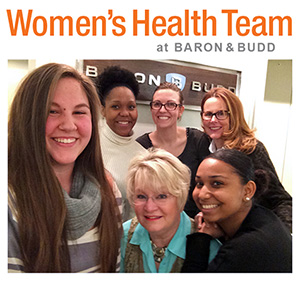This Women’s History Month, Our Women’s Health Team is Taking a Stand Against Dangerous Pharmaceuticals

One month a year, we take time to remember the many contributions of both famous and “ordinary” women. Women’s History Month was started as a means to bring the her back to “his-story” (or, history) and since then the month has grown from college classrooms to a national holiday — one that honors the women who have fought and won the many rights for women that we have today.
Women’s suffrage and the right to vote. Equality of education and access to healthcare. Laws that protect women both in the workplace and in the home. An equal or even predominately female enrollment in graduate, medical and law schools across the country… Yes, we have come a long way, us women.
But hold it right there.
We still have some things to fix up. One of those things is something we fight for every day at Baron and Budd, yet it largely exists under the radar of national media. That something is the protection of women from negligent pharmaceutical companies that have historically caused disproportional harm to women.
Think about this for a second: Women take more prescription medications than men and visit their doctors more than men and yet, women are still disproportionally represented in prescription medication safety testing.
Three drinks at a bar for an average-build man may allow him to walk out the door fine, but for an average-build women three drinks may be one too many. Same story goes for medications: WOMAN ARE DIFFERENT THAN MEN.
So what do we do about this? Well, at Baron and Budd, we created a Women’s Health Team, a group of women (hey there!), that is specifically trained and dedicated to helping women who have been injured by pharmaceuticals.
Here is a list of some of the pharmaceuticals that are injuring women today that our Women’s Health Team is working on, both by assisting women who have been injured and by fighting for these women in the courtroom.
[tabs tab1=”Transvaginal Mesh” tab2=”Zoloft” tab3=”Lipitor” layout=”horizontal” backgroundcolor=”” inactivecolor=””]
[tab id=1]
Transvaginal Mesh
A medical device often used to treat urinary incontinence, transvaginal mesh has been noted by the FDA to involve serious risks including infection, pain, recurrence of prolapse, urinary problems, incontinence and erosion through the vaginal epithelium. The FDA has also found that transvaginal mesh often shrinks once inside the patient, causing pain and injury. There have also been reported cases of bowel, bladder and even blood vessel perforation during the insertion of transvaginal mesh and reports of vaginal scarring, discomfort and pain including dyspareunia.
[/tab]
[tab id=2]
Zoloft
The most widely prescribed antidepressant in the U.S. by 2005, Zoloft was marketed as a safer drug with fewer side effects compared to other drugs in its class like Prozac. However an FDA Public Health Advisory warning was issued in 2005, another strong warning was issued by Health Canada in 2006 and a study published in the New England Journal of Medicine soon followed in 2007. What did they find? An association between Zoloft and heart issues called septal defects, which can be life-threatening. According to the New England Journal of Medicine, mothers who took Zoloft during pregnancy could have twice the risk of having a baby born with septal defects.
[/tab]
[tab id=3]
Lipitor
Women have been found to have an alleged risk of developing type 2 diabetes while taking the cholesterol-lowering statin medication known as Lipitor. In January of 2012, a study published in the medical journal of Archives of Internal Medicine found that female patients between the ages of 50 and 70 who took statin medications such as Lipitor were 48 percent more likely to develop type 2 diabetes as compared to women in the same age group who did not take the drugs. Unfortunately, the type 2 diabetes is a life-long condition and is not reversible once the patient is diagnosed. Other severe side effects associated with Lipitor include muscle and liver problems, jaundice and kidney failure.
[/tab]
[/tabs]
Equal? Well, we’re not there yet. Instead, women are disproportionately harmed by pharmaceuticals. And it’s time to stand up to these pharmaceutical giants and tell them No More. We, our mothers, our sisters, our best friend… we all deserve to live a life not worrying if our birth control will give us a heart attack or if a transvaginal mesh surgery could require thousands of dollars for multiple revision surgeries.
